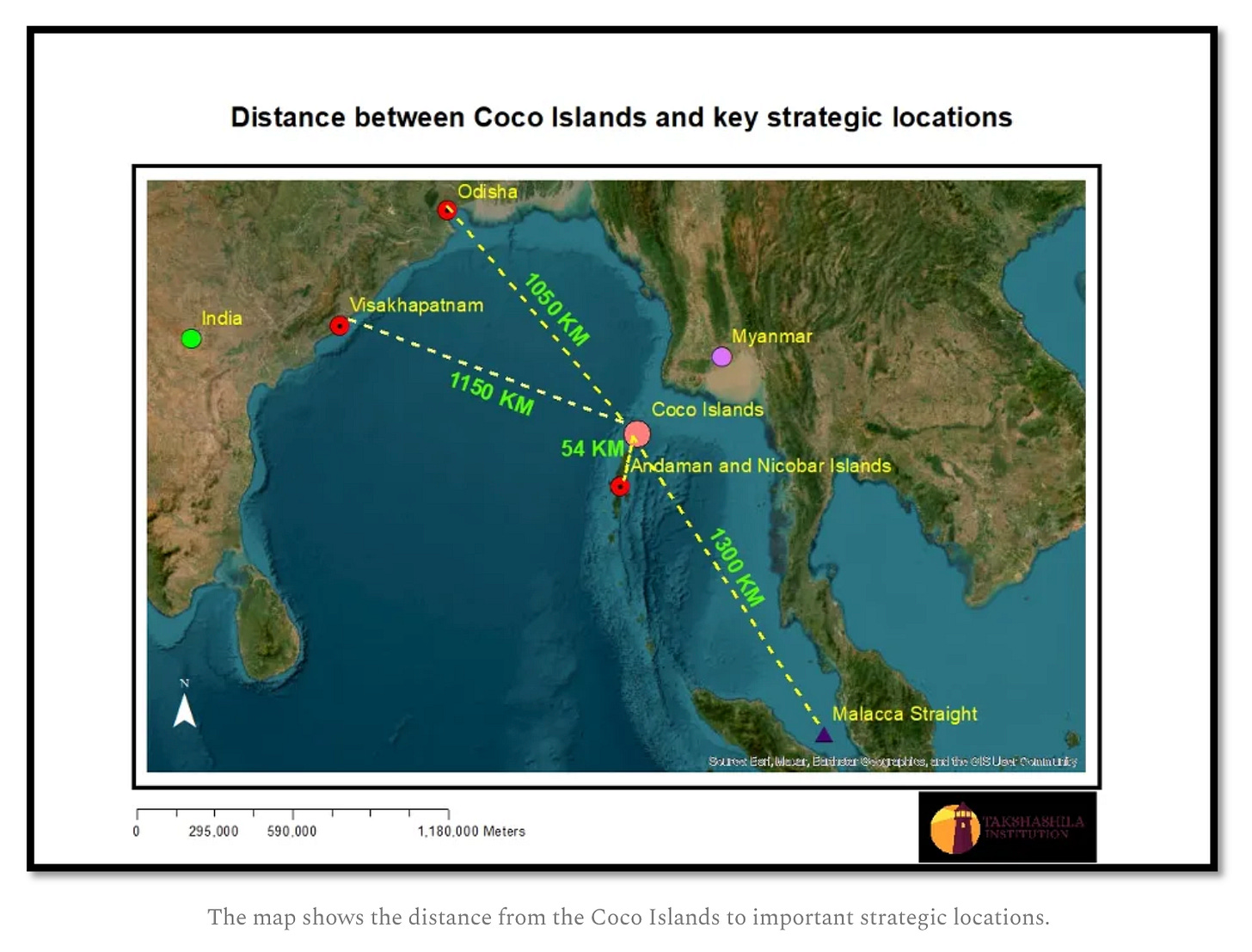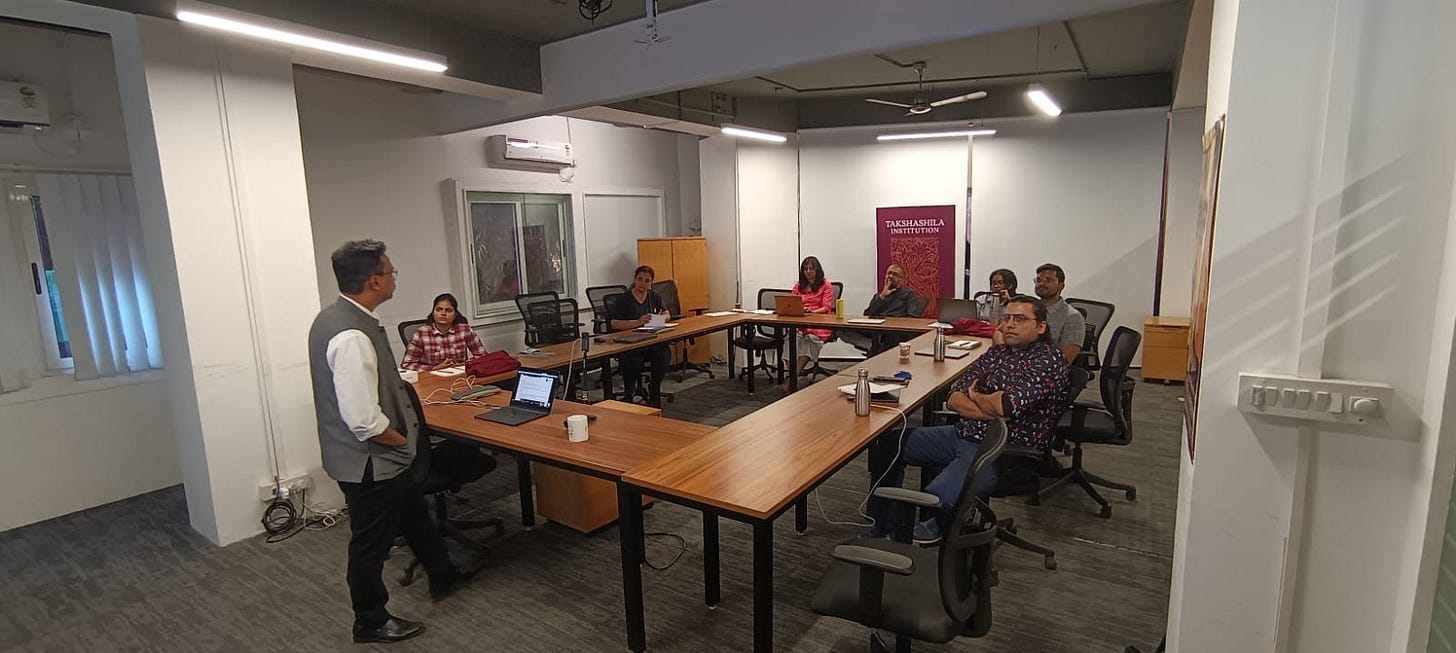Launch | Takshashila Geospatial Bulletin: What’s Happening in Coco Islands?
Dear Reader,
Welcome to Takshashila Dispatch. We are happy to announce a new and first-of-its-kind monthly newsletter Takshashila Geospatial Bulletin, curated with intel and insights from open-source geospatial datasets.
In this edition of Dispatch, we also cover our work on policy options for India in boosting its electronics manufacturing sector by leveraging the Information Technology Agreement, our proposals for the UN’s New Agenda for Peace, policy recommendation to the G20 on reducing malnutrition by half by 2030, government overreach in digital marketplaces, the effectiveness of the free bus rides for women policy, and tackling AI misinformation as India heads into general elections in less than a year.
Takshashila Geospatial Bulletin #1: Unravelling Secretive Military Infrastructure in Myanmar's Coco Islands Groups
The Takshashila Geospatial Bulletin is a monthly newsletter offering insights into India’s strategic affairs using openly available geospatial data. It is authored by Dr. Nithiyanandam who heads Takshashila’s geospatial research.
The first edition of the newsletter offers a deep dive into the military build-up around Myanmar’s Coco Islands, which lie close to India’s Andaman & Nicobar Islands.
From a strategic perspective, Dr. Nithiya writes:
The recent developments in the Great and Little Coco Islands suggest an increased likelihood of extensive military activity. These developments include changes to land cover, deforestation, and the construction of larger airbases, helipads, naval piers, and advanced signal intelligence facilities. Myanmar's relationship with China makes the island group a potential military outpost for China. This would enable China to closely monitor India's nearby military installations and movements in Malacca Strait and the Bay of Bengal.
Our comprehensive examination of the Great and Little Coco Islands has uncovered compelling evidence of an underground facility that may be assisting Chinese submarines. This finding holds significant strategic operational and tactical implications for the Indo-Pacific region.
Analysing India’s Position on the Information Technology Agreement
The latest Takshashila Discussion Document by Satya S. Sahu and Miheer Karandikar studies India’s performance in manufacturing information and communication technology (ICT) goods, in the context of it being a signatory to the Information Technology Agreement (ITA).
While India has failed to leverage the low tariffs under the ITA for manufacturing ICT goods unlike China, Malaysia, Vietnam, and Taiwan, the paper argues that India’s absent complementary industrial and investment policy hamstrung the sector in the past. Based on feasibility and effectiveness, it offers concrete policy recommendations for the growth of India’s ICT sector in the short, medium, and long run.
Proposals for the U.N’s New Agenda for Peace
Recently, we submitted our policy proposals to the U.N. New Agenda for Peace, which seeks to “address a myriad of challenges the international community faces today” and aims to reduce strategic risks, strengthen international foresight and capacities to identify and adapt to new risks and invest in prevention and peacebuilding.
Based on our extensive research in the past, we made three proposals centering around the following:
Aiming for Nuclear Peace: The Global No-First Use Treaty
Strengthening the Biological Weapons Convention For Combating Emerging Threats
Introducing the Global Space Situational Awareness Treaty: A New Agenda for Peace in Outer Space
Read our past work on these issues here, here, and here.
Takshashila’s 7th Cohort of PGP Kicks Off
The 7th cohort of Takshashila’s Post-Graduate Programme in Public Policy kicked off on Friday, June 9, with an orientation in Bengaluru and Delhi.
The Takshashila Institution is a pioneer in public policy education. Takshashila’s unique pedagogy allows individuals to study from anywhere while pursuing their current occupations. For more details, check out our 12-week Graduate Certificate in Public Policy (GCPP), year-long Post Graduate Programme (PGP), and short-term Special Credit Courses (SCC).
Reducing Malnutrition Across G20 Countries by Half by 2030
Malnutrition, which includes undernutrition, micronutrient-related malnutrition, and obesity & diet-related malnutrition, directly impacts multiple sustainable development goals. In a Policy Brief titled ‘Reducing Malnutrition Across G20 Countries by Half by 2030’ authored by Shambhavi Naik and Dr. Harshit Kukreja for Think20 (engagement group of G20), we propose the following:
Government Overreach in Digital India
In achieving its vision for a Digital India, the government has taken up several initiatives for building digital infrastructure such as UPI, ONDC, mSeva & GeM, and entered the digital marketplace as a player. In an opinion for MoneyControl, Anupam Manur argues that this is not justifiable when alternatives are available:
Since every government intervention in markets has costs attached to it and can create deep distortions, it requires irrefutable justification. In economics, the only acceptable justification for government intervention is the correction of market failure (public goods, externalities, information asymmetry, and concentration of market power). So, what is the market failure in app stores and e-commerce?
These products are generally projected as solutions to the problem of concentration of market power, i.e., the digital economy is dominated by a few big foreign players, and we therefore need an Indian player in the mix. This line of reasoning, while attractive at first glance, is fallacious.
True, the digital economy, whether app stores, cab aggregators or e-commerce, tends to have some concentration of market power due to the existence of network effects. In competition law, however, just having a large market share and being dominant doesn’t necessarily mean that it’s harmful.
Police Chowki Episode Four | Criminal Cases: Investigation, Prosecution & Accountability
The rule of law requires the police to ensure that criminals are properly investigated, prosecuted, and punished to ensure justice for the victims. In today’s episode on Criminal Cases, Javeed Ahmad takes Shrikrishna Upadhyaya through the nitty gritty of criminal investigations by police in India, from the crime site to criminal investigation, and till the sessions court pronounces its verdict. He answers questions on the rights of the accused, opposition to bail by the police, media trials, plea bargaining, and more.
Free Bus Travel is Not a Silver Bullet
The Karnataka government kickstarted the scheme for free transport for women in state buses yesterday. In an opinion for Deccan Herald, Suman Joshi argues that while this move has tangible benefits for women in terms of accessibility, safety, and autonomy, the burden for the government to accomplish is far higher:
Free bus travel is not a silver bullet. There will be several challenges in the implementation of this scheme. The increase in demand will necessitate expansion of capacity through fleet strength, and human resources, further draining the State exchequer. The government will need to find other sources to offset some of this loss to make it viable in the long run. This is just one of the levers that the government can use to alter economic and societal outcomes. For the long term, the government should provide enough reasons for people to be using public transport, viz. economic activity. This move only places more onus on the government to ensure it carries out its basic functions effectively, which is to create a conducive environment for businesses and employment and guarantee public safety for everyone.
2024 Elections | Can We Fact Check Disinformation Created Using Artificial Intelligence?
AI tools such as DeepFake have been around for years, but with the launch of advanced generative AI tools such as ChatGPT, MidJourney, DALL-E, etc, artificial intelligence has come into the front and centre of fake news generation and its spread. Boomlive's Karen Rebelo, one of India's leading fact checkers, joins Sachin Kalbag in this conversation where they dissect the ominous future of AI-led disinformation campaigns as India heads into election mode in 2024.
That’s all for this week! Take care.









